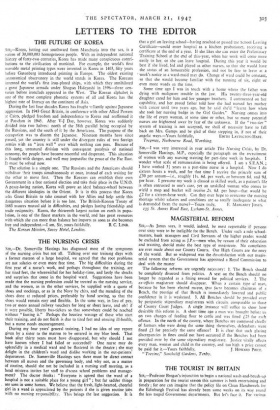MAGISTERIAL REFORM
SIR,—As Janus says, it would, indeed, be most regrettable if- persons over sixty were to be ineligible for the Bench. Under such a rule school- masters, bank managers and Civil Servants of the higher grades would be excluded from acting as J.P.s—men who, by reason of their education and training, should make the best type of magistrate. No complaints are ever made about our County Courts. Our High Courts are the envy of the world. But so widspread was the dissatisfaction with our magis- terial system that the Government has appointed a Royal Commission to deal with the matter.
The following reforms are urgently necessary: 1. The Bench should be completely divorced from politics. A seat on the Bench should no longer be regarded as a fitting reward for political services. 2. The ex-officio magistrate should disappear. When a certain type of man, because he has been elected mayor, ipso facto becomes chairman of a Bench, the prestige of that Bench is immediately lowered and public confidence in it is weakened. 3. All Benches should be presided over by peripatetic stipendiary magistrates with circuits comparable to those of County Court Judges. A single , instance will suffice to show how desirable this reform is. A short time ago a man was brought before us on two charges of feeding flour to cattle and was fined £25 for each offence. In the north of the county, where Benches are composed chiefly of farmers who were doing the same thing themselves, defendants were fined £1 for precisely the same offence! It is clear that such glaring discrepancies in fines could not have occurred. if the Benches had been presided over by the same stipendiary magistrate. Justice vitally affects every man, woman and child in the country, and too high a price cannot
be paid for it —Yours faithfully, J. HOWARD PRICE. " Trevine," Southcliff Gardens, Tenby.


































 Previous page
Previous page